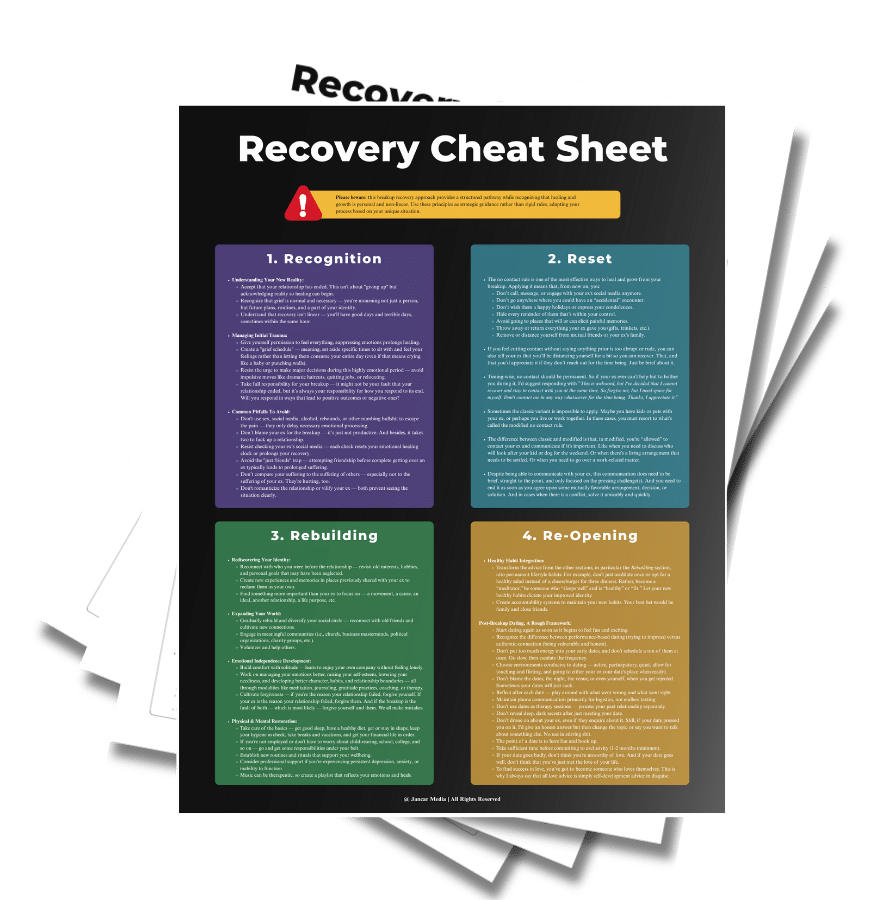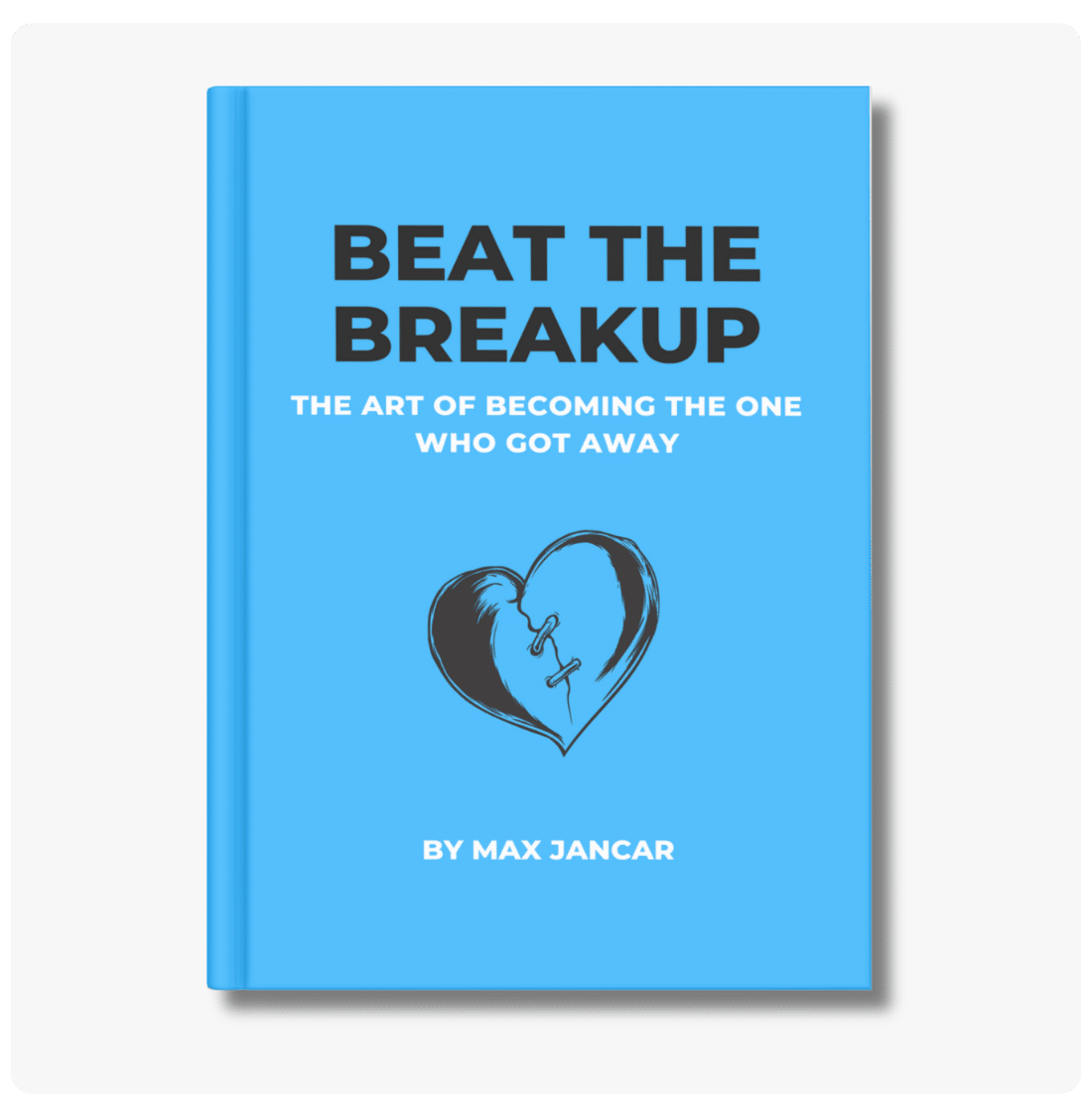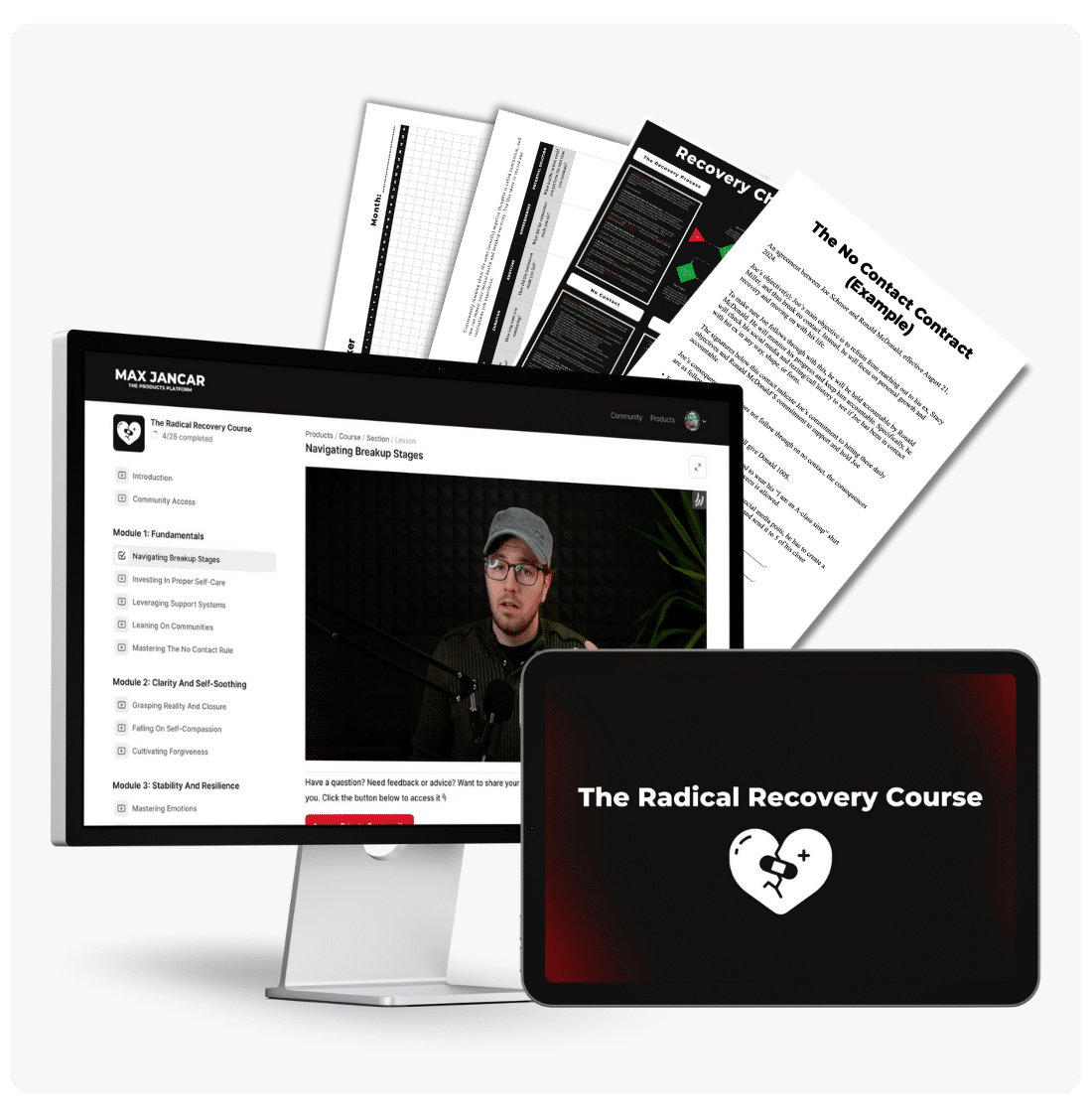Click play to listen to this article.
A breakup will undoubtedly stifle your productivity. You’ll have a harder time focusing and getting into the flow state, your motivation will be spotty, you’ll be in constant danger of lethargy, and your creative output will grow feeble or even become non-existent.
And while productivity is a very personal thing — meaning what works for me may not work for you — there are certain universal and tried and tested principles you can follow to boost it and keep it at a maximum. (1)
A guide to breakup recovery based on embracing discomfort, extracting wisdom from dark moments, and healing through evidence-based practices.
Order Your Copy1. Master The Balance
Productivity is one tricky motherfucker…
On the one hand, if you treat yourself like a slave, working 24/7, never letting yourself have breaks or fun, you will eventually burn out. On the other hand, if you’re too lax on yourself, give yourself too much free time, fail to stick to schedules and commitments, and never hold yourself accountable, you won’t get anything done.
Your main goal with productivity should be finding the ideal balance between these two extremes — a sort of Goldilocks Zone. Where things get tricky, however, is that everyone’s Goldilocks Zone is at a slightly different position, and there is no way you can find yours without ruthless experimentation and making a string of idiotic mistakes.
This cheat sheet lays out 40+ solutions to overcoming a breakup so you can create a new opportunity for love — be that with your ex or someone completely different.
Get The Free Cheat Sheet2. Focus On Quality Work
These days, everyone wants you to hustle. Slaving away at 12-16 hour workdays is slowly becoming the norm. And if you work any less than that, you’re normally shamed and belittled for it, especially if you’re a dude.
But here’s the thing: working 12 hours a day doesn’t necessarily mean you’ll be more productive than the person working, say, only 6. Because those additional 6 hours will probably produce little to no fruitful results.
Studies show that just about everyone only has 3-4 hours per day of truly productive and creative work in them. So I’d advise you to optimize your day around those 3-4 hours and consider any additional spurts of productivity past that as a bonus. (2)
3. Cap Creative Work
This tip piggybacks on the last. When I started out blogging, I wrote about 5-7 hours per day. But over time, I realized something interesting. I realized my creative work, at a certain point, began to produce diminishing returns. (3)
Put differently: after doing a certain amount of work, I was actually better off not working. That’s because I — as all of us do — hit a point where the more work I produced, the worse it was, which only created more work the next day when I had to fix my previous shitty work.
For instance, whatever I wrote in the first 2-3 hours was usually on-brand, had a nice flow and rhythm, and needed minimal editing. But whatever I wrote after the 2-3 hour mark was always a hodgepodge of average and flaming dogshit — and I always lost hours the next day revising it.
It wasn’t until I limited my writing time to 2 hours per day that my productivity skyrocketed. It sounds counterintuitive, but by capping your creative work, you’ll save yourself from hours of needless additional work the next day.
4. Take Strategic Breaks
An online course that teaches you how to heal and grow from a breakup so you can create a new possibility for love — with or without your ex.
Get Instant AccessOne of the best ways to stymie your productivity is by taking a series of random, on-a-whim breaks. For example:
- One moment you’re writing an article, and then, seconds later, you’re on Twitter looking at the infinite instances of outrage porn, memes, and cat gifs.
- After a few minutes of mindless browsing, you’re back to your article. But would you look at that — your favorite author just tweeted. Back to Twitter, it is!
- And since you’re all caught up now, it’s time to check what’s new on Facebook. Aaaaaaand shit, you just saw a post from an old friend. He got engaged a day ago while you’re freshly heartbroken and gorging on Ben and Jerry’s in your underwear. Sucks to be you, doesn’t it?
- You try to continue writing that article again, but nothing comes out. So you start reading random video game news websites out of frustration. And in the blink of an eye, it’s already midnight, you’ve done no work, and you’re as miserable as ever.
- More Ben and Jerry’s, I guess…
To avoid or mitigate anything akin to the above psychological death spiral, schedule strategic breaks ahead of time — preferably a day before. This means deciding — at best, writing it down — when you’re going to work and when you’ll let yourself play, unwind, and goof off. (4)
5. Ruthlessly Kill Distractions
The inverse of focus is distraction. Hence, to be able to focus better and, in turn, be more productive, eliminate as many distractions as possible. (5)
Turn off push notifications from your devices. Uninstall pointless apps. Unfollow news and media outlets and anyone who is not providing actual value to your social media newsfeeds. Put your phone on mute for at least the first 3-4 hours of your workday. Use specialized phone and computer blocker software to limit or completely restrict certain websites and apps that you might lose yourself in.
Some good blocker software: Cold Turkey (Mac/Win), FocusMe (Mac), or HeyFocus (Mac), Freedom (Mac/iOS), Screen Time (iOS), Digital Wellbeing (other phone operating systems), Help Me Focus (other phone operating systems).
If you’re feeling extra ballsy, buy a timer for your power outlets. It’s a nifty little device you can program to cut off power across your home at certain days of the week and times of the day.
And if you’re a fucking masochist, buy yourself a safe with a timer too. Then place your phone inside of it, and program it so it only opens, say, in the evening — when you’ll (presumably) finish work for the day.
6. Go From Shallow To Quality Info
Instead of gulping down clickbaity, shallow, and short-form content, limit yourself to consuming solely realistic, thoughtful, and long-form content. These will primarily be longer articles (or at least well-research ones), podcasts, books, and documentaries.
Here are some resources for quality long-form content: Longform.org, Aeon, Wikipedia Front Page News. And here are some nifty browser plugins that will help you limit crappy short-form content: DF Youtube, Kill Facebook Feed, Insta Feed Eradicator.
A few notes about consuming entrainment media:
- If you’re a gamer, play a deep, immersive, and innovative game like Dishonored, Bioshock, Dead Space, or Elden Ring, instead of, say, a stupid mobile game.
- If you’re into music, don’t just leave a song on repeat, put on the entire artist’s album. Perhaps even explore similar artists and listen to their albums.
- If you’re into sports, don’t just watch 2-minute youtube clips about your favorite player, watch an entire documentary about them — maybe even read a book about them if that’s possible.
7. Review Your Performance Often
I know it sounds tedious, but it’s not; it’s easy. Here’s how it goes. Every evening, or whenever you finish work, block out 15 minutes and follow the steps outlined below.
Step 1: assess your day. Reflect on what you’ve done today and how well you’ve done it. I usually do this by taking a light stroll, talking to myself, and then making mental notes on everything. But you can also do it by sitting down wherever and noting your insights on a piece of paper or an Excel document. Whatever floats your boat.
Step 2: plan the next day. I usually just jot down all the tasks I must do the next day. Nothing fancy, just a plain to-do list I type into Notion — a glorified notes app. If it suits you, you can also write down some short-term goals you’d like to hit on this to-do list — that is, goals you’d like to achieve in the next 1-3 months. I found doing this helps keep my focus in check and prevents me from losing my mind over stuff that doesn’t move the needle in my business.
Step 3: do a weekly and monthly review (optional). I personally don’t do this because I never found it helpful. But studies show it works wonders for most people, so here’s how you do it. When it comes to weekly reviews, reflect on your current work and set new goals at the end of each week. And when it comes to monthly, do the same thing as with weekly reviews, but on the first day of every new month. (6)
8. Just Do Something
Most people think they need motivation to be productive, but that’s a false and dangerous belief. At best, it leads to procrastination and intellectualization. At worst, it leads to passivity and spiritual stagnation.
The truth is that to become motivated, you first need to be productive. And being productive starts with doing something — anything, really. Even if it’s the smallest and easiest viable action you can take.
So the next time you feel lethargic and apathetic about hitting a certain goal, don’t wait for motivation to strike. Just do something to generate it, and then harness it. Eventually, you will become productive because of this and get closer to hitting your goals.
Here’s an example: on days when writing doesn’t come easy, I force myself to simply write one or two sentences. That’s it. If I can’t do that, I take the day off or go and work on something else. To my surprise, those two sentences almost always turn into three, four, five sentences, and then a whole paragraph, and then a whole page, and so on. In other words, executing a tiny action toward completing a particular task gives me the momentum to actually finish the task.
9. A Few Tips on Staying Productive
Get an accountability buddy. This is someone — be it a friend, family member, or coworker — that keeps you accountable for reaching your goals. You can also take this tip to the next level by giving your accountability buddy a check for X amount of $, and telling them they can cash it if you fail to do XYZ until a certain point in time.
Live by design, not by default. Instead of making choices reactively, deliberately distinguish the vital few from the trivial many, eliminate the nonessentials, and then remove obstacles so the essential things have a clear, smooth passage. In other words, don’t try to get it all done. Focus on getting the right things done.
Build smart habits and routines. For example, I keep my mornings sacred for research and writing since a) I’m most productive then, and b) it’s the best use of my time, profit and fun-wise. And I keep my afternoons reserved for sales, video/audio work, or admin shit — basically all the other annoying things that come with having an online business.
Apply the “Law Of Fuck Yes Or No”. Most of us have work lives filled with mediocrity. We say yes to things that we feel half-hearted about too often. And then we miss out on the great because we’re busy with the mediocre. The solution is to say yes to less. So next time, if you’re not feeling a “fuck yes!” about doing something, consider it a “fuck no!” Get ruthless about this! (For an in depth guide on this law read this article.)
Avoid task switching. Repeated task switching takes a massive toll on your mental energy, leading to diminished productivity. So try to minimize it. To illustrate: I made a rule for myself to only work on 1 to 3 different daily tasks — these are usually reading, writing, and client/admin work OR video/audio work. On a similar note, avoid multitasking — any attempt to do it will only result in impeded productivity. (7)
Let your mind wander. In other words, let yourself think and daydream about anything from time to time. This gives your mind a moment to relax. And as a result, you’ll not only have improved focus, but you’ll also get more creative and better at problem solving. (8)
Invest in your identity. Get quality sleep. Maintain a healthy diet. Do some form of exercise at least three times a week. Keep your hygiene in check. Have a life outside of work. And, perhaps most importantly, figure out what’s important to you — what you value — for that’s not only a compass for your behavior but also the engine of your productivity.
10. Let Your Productivity Systems Evolve
Developing your own productivity system is a constant work in progress. What works for you now may not work for you a week, month, or year later. A few personal examples:
- Years ago, I was a night owl, doing my best work from 6 pm to 11 pm. Then I became an abnormally early riser, doing my best work from 3 am to 7 am. And now I’m somewhere in between, waking up at 6 am and doing my best work from 8 am to 12 am.
- Years ago, I obsessively abused calendars, created ingenious databases of every book and article I read, made a bazillion to-do lists, and kept track of everything in my life (sleep, diet, goals, habits, etc.) in an excel spreadsheet. Today I don’t do any of that anymore. I run my entire business and life on a one-page digital note in Notion (See: Principle 6).
- Years ago, I could work in a noisy and messy environment. Now I abhor it. I can’t function if the room I’m working in isn’t distraction-free and tidy as fuck.
When changes like these start to pop up in your life, don’t avoid them or try to fend them off. Welcome and embrace them. Hell, give into them. They’re normal.
This cheat sheet lays out 40+ solutions to overcoming a breakup so you can create a new opportunity for love — be that with your ex or someone completely different.
Get The Free Cheat SheetRelated Reading
- Never Suffer Alone September 7, 2023
- How To Stop Obsessing Over Your Ex: 12 Solutions For Success March 29, 2024
- Deserving Is Not The Point September 27, 2023
- How To Rebuild (Or Build) Self-Esteem After A Breakup February 26, 2020
- A Realist’s Guide To Finding A Life Purpose After A Breakup September 10, 2021
- How To Find And Sustain Motivation After A Breakup May 29, 2024



